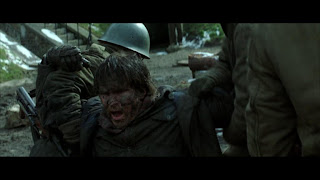 Dostoyevsky’s ‘Crime and Punishment’ is only nominally about crime and not literally about punishment. Not in the judicial sense of the word. It’s about the punishment the psyche imposes upon oneself. ‘Crime and Punishment’ is about the crushing weight of guilt.
Dostoyevsky’s ‘Crime and Punishment’ is only nominally about crime and not literally about punishment. Not in the judicial sense of the word. It’s about the punishment the psyche imposes upon oneself. ‘Crime and Punishment’ is about the crushing weight of guilt.It’s another Dostoyevsky novel (‘The Idiot’) that Trevor Reznik (Christian Bale) reads in Brad Anderson’s ‘The Machinist’, but it’s not the Christ-like man-child Prince Myshkin to whom Reznik invites comparison. Imagine Raskolnikov, the anti-hero of ‘Crime and Punishment’, not as an idealistic yet compromised student but a blue-collar factory worker. Imagine he hasn’t slept properly for a year. Imagine that he spends his evenings at an airport coffee shop where he cultivates a stilted but poignant rapport with waitress Maria (Aitana Sanchez-Gijon) and his nights in the company of call girl Stevie (Jennifer Jason Leigh) – an archetype of the Dostoyevskan “fallen woman” if ever there was one.
 If I seem to be overdoing the whole Dostoyevsky thing, it’s because Scott Kosar’s script and Anderson’s stylized but atmospheric direction continually draw attention to the parallels. It’s particularly fascinating that Kosar – whose other produced screenplays have been for the remakes of horror genre staples ‘The Texas Chain Saw Massacre’, ‘The Amityville Horror’ and ‘The Crazies’ – dabbling in a psychological drama so explicitly inspired by one of the heaviest hitters in all of literature.
If I seem to be overdoing the whole Dostoyevsky thing, it’s because Scott Kosar’s script and Anderson’s stylized but atmospheric direction continually draw attention to the parallels. It’s particularly fascinating that Kosar – whose other produced screenplays have been for the remakes of horror genre staples ‘The Texas Chain Saw Massacre’, ‘The Amityville Horror’ and ‘The Crazies’ – dabbling in a psychological drama so explicitly inspired by one of the heaviest hitters in all of literature.‘The Machinist’ superficially unfolds as a thriller – Hitchcock as if filtered through David Lynch – with Reznik blamed for the industrial accident which costs a colleague his arm, and sent to Coventry by his colleagues. Gaunt, hollow-eyed and painfully thin, even before his involvement in the accident Reznik is drawing the wrong kind of attention from the management, who want him to take a random drugs test. Taking a smoking break to cool off, he meets the mysterious Ivan (John Sharian) who tells him he’s standing in for a co-worker. It’s Ivan who distracts Reznik at the crucial moment, deliberately it seems, and Reznik is left looking highly blameworthy when the shit hits the fan. Things take a strange turn when colleagues and management alike profess to never having heard of Ivan.
 Cryptic notes resembling a game of hangman turn up in Reznik’s apartment. He catches his eccentric landlady Mrs Shrike (Anna Massey) letting herself in. Stevie turns up with a black eye; she describes it as an “occupational hazard”, but Reznik wonders if it’s courtesy of her “psychotic” ex. Reznik starts to suspect that said ex is Ivan.
Cryptic notes resembling a game of hangman turn up in Reznik’s apartment. He catches his eccentric landlady Mrs Shrike (Anna Massey) letting herself in. Stevie turns up with a black eye; she describes it as an “occupational hazard”, but Reznik wonders if it’s courtesy of her “psychotic” ex. Reznik starts to suspect that said ex is Ivan.And what’s Ivan’s connection with Maria’s son?
The thriller aesthetic, albeit tempered by low-key character-based scenes, defines the first two thirds of the movie. A photo lifted from Ivan’s wallet points Reznik towards someone at the factory. The alignment of letters in the hangman notes suggest the surname of someone else. A ride on a ghost train seems to trigger memories. Scenes are rhymed. Images are revisited and recontextualized. Symbolism is rife: a tunnel or passageway branching off in two directions; tableaux in the ghost train ride that prove analogous to events in Reznik’s life; landmarks which seem imbued with relevance even before the big reveal.
 The last third contains some real narrative curveballs. The linearity becomes suspect. What’s taking place in the present? In the past? In Reznik’s increasingly disturbed mind? The film almost completely deconstructs before the pieces are reordered and everything is explained.
The last third contains some real narrative curveballs. The linearity becomes suspect. What’s taking place in the present? In the past? In Reznik’s increasingly disturbed mind? The film almost completely deconstructs before the pieces are reordered and everything is explained. ‘The Machinist’ is almost too clever for its own good, particularly in the inclusion of certain tropes which are highly reminiscent of Christopher Nolan’s ‘Memento’. There are some significant literary references – look out for the placement (and I do mean the literal placement) of the Kafka reference – which are at odds with the casual manner Anderson tries to incorporate them. Also, the big reveal is done with such accomplished cinematic sleight of hand that the directorial flourish threatens to outweigh the emotional cachet of the scene. Fortunately, Anderson knows exactly how to structure the film and exactly where to cut or transition a scene; and the whole thing is anchored by a cluster of excellent performances.




















